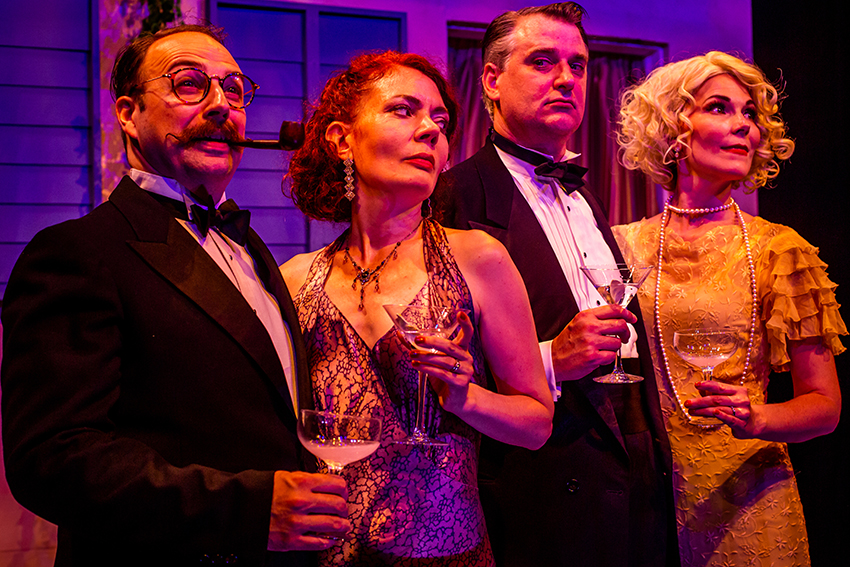Despite that Noël Coward was gay, he wrote one of the most famous plays about contemporary heterosexual relationships.
“Private Lives,” a 1930 comedy of manners in three acts, had its second act nearly censored in Britain for being too risqué. Now the production seems quaintly literary, but for a piquant hint of sass and salaciousness.
Jennifer Summerfield stars as Amanda Prynne in Hedgerow Theatre’s production of “Private Lives,” through Aug. 4. Peter Reynolds, the out artistic director for Mauckingbird Theatre Company, helmed Coward’s “Blithe Spirit” and “Fallen Angels” and now adds this series to his repertoire.
PGN: How relevant is Coward’s material today?
PR: We can’t listen as long or as well as we used to be able to. Coward writes in long thoughts, a definite challenge for our monosyllabic culture. It was beautiful to see the “Fallen Angels” audiences delight and relate to the eccentric and sometimes-hysterical behavior of the characters, which were created in 1927.
JS: The number-one comment I’ve heard is that the play is so shockingly modern in its tone and philosophy and language. It’s a joy to say lines that resonate today. You don’t necessarily expect a male playwright from the 1930s to have such a feminist outlook, but when Elyot says, “It doesn’t suit women to be promiscuous,” I love being able to return with, “It doesn’t suit men for women to be promiscuous.” In fact, the entirety of Act Two feels like it could have been written yesterday, as Elyot and Amanda grapple with the meaning of life and death, how to live authentic lives and what the cost of happiness is. I thought that perhaps in 2019, people wouldn’t be as shocked by the infidelity of the protagonists as they might have been in 1930. But when Elyot offers Amanda a cocktail in Act One, there’s invariably an audible murmur from the audience, which I find thrilling. It makes me feel like the play is a living thing, which it is.
PGN: In a 2005 article, Penny Farfan contended, “The subversiveness of [Coward’s] sexual identity is reflected in his work,” adding that “Private Lives” questions “the conventional gender norms on which compulsory heterosexuality depends.” Thoughts?
PR: I agree with her. Mauckingbird was allowed to produce “Fallen Angels” with two male-male couples and the result was fascinating. We did Coward’s play exactly as written.
JS: In Act One, Coward sets up the idea of the “conventional” gender-normative marriage, what is “suitable” for women vs. what is “desirable” for men, and just how trite and dull such expectations are. Both Victor and Sybil — the new spouses — fit the conventional mold of “feminine” and “masculine”: Sybil is terrified of getting a sunburn because it’s unattractive for women, and Victor is constantly threatening to knock someone down if they upset him. What draws Amanda and Elyot together is that neither one of them has such expectations of suitability. They’re free to be completely themselves, to live on impulse without worrying about what society thinks.
PGN: Coward called the play “psychologically unstable” and John Lahr, in a 1982 study, wrote: “Elyot and Amanda’s outrageousness is used to propound the aesthetics of high camp — an essentially homosexual view of the world that justifies detachment.” What do you think?
PR: I believe Coward delighted in creating fabulous characters, as he himself was fabulous, and I imagine Gertrude Lawrence was as well. Coward — and Cole Porter as well — was expressing himself through his writing, creating worlds where he belonged. At a time when straight was the only allowable option, perhaps Coward wrote the only possible straight, married world in which he might fit.
JS: I’m not sure what Coward meant by “psychologically unstable,” except that the emotions run high and Amanda and Elyot thrive on passion and a bit of chaos. If things get too casual or peaceful, one or both of them feel the need to stir things up. From the outside, you think: Why are you doing this? Why can’t you just be happy? But their happiness depends on the extremes of human experience, which also explains their love of travel and exotic locations. They get high on new experiences and sensations. I certainly don’t find them detached — although Elyot’s philosophy of living for the moment and ignoring anything that gets in the way of your personal happiness might imply a certain detachment from others. But, speaking for Amanda, she’s a highly emotional and sensitive person who recognizes the hurt her actions have caused.
PGN: Finally, critic Michael Billington wrote: “It is not a closet gay play but a classic about the mysterious charm of androgyny.” What’s your take?
PR: Interesting idea. Again, Coward was dealing with the given circumstances of the world in which he lived.
JS: This goes back, in my mind, to the ideas of gender and conventional male and female roles within marriage and society. There’s a great deal of the conventionally feminine in Elyot and the supposedly masculine in Amanda in the ways they choose to live their lives, how they deal with conflict and their sensitivity and use of language and physicality. They are the perfect match for one another, equal parts male and female.
“Private Lives” runs through Aug. 4 at Hedgerow Theatre Company, 64 Rose Valley Road, Rose Valley. For more information and tickets, visit hedgerowtheatre.org.
